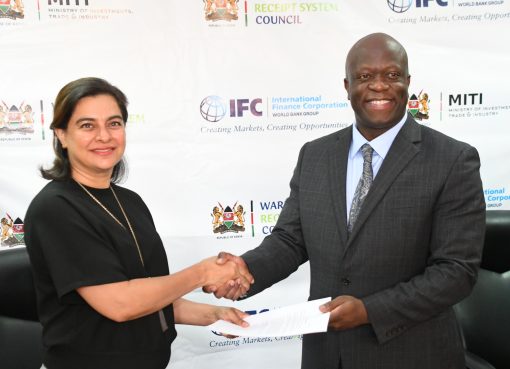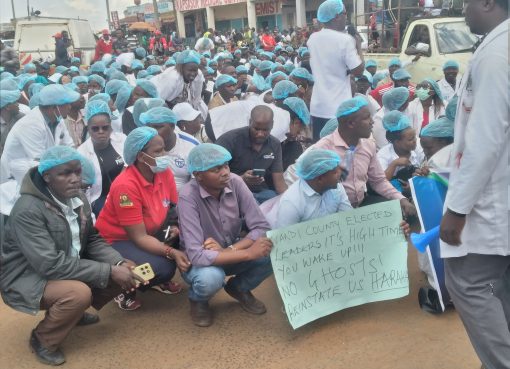The man, Al Haji Abdulahi Kiptanui, is a well-known politician cum trade unionist in the Kericho region and a darling of the Kericho media as he readily comments on topical issues affecting the county and the country at large.
He is also respected and consulted on various issues by both the national and county governments of Kericho, following his 40-year experience serving the community at the then Kericho Kipsigis County Council.
Despite his advanced age, Kiptanui stands out from the ordinary elderly people in the streets of Kericho town as he is loaded with knowledge and history of Kericho town.
In an interview with KNA, Kiptanui says he was born in 1949 in Bomet County but has lived in Kericho for the better part of his life.
“I was born in 1949 in Kiogong village in Bomet County. My parents have passed on; my mother, Rehema Tabuseroy, hailed from Bomet County, and my late father, Maniklal Manizekar, was from India,” says Kiptanui.
“Both of my parents moved to Kericho County, where they enrolled me at Kericho County Township primary school, and I later proceeded with my intermediate studies at the same school,” he adds.
Unfortunately, he had to drop out of school in 1963 due to lack of school fees and go job hunting. He was lucky enough to be employed as a clerk reliever at Chamogodany Hospital in 1966, but only worked for six months.
“I started looking for another job and was lucky enough to get an opportunity to work as a caretaker at the Kericho Green Stadium, earning Shs 240 per month; the year was 1967,” adds Kiptanui.
With nostalgia, Kiptanui recalls how he planted and nurtured the numerous trees around the Kericho Green stadium while working as a caretaker, a job he held for two years and left following a disagreement with the then Kericho District Commissioner Milton Ole Njaro.
Kiptanui joined the Kenya United Tenants Union in 1967 and was elected deputy national secretary the following year. The union at the time was representing tenants against exploitation by landlords.
“I was the deputy national secretary between 1968 and 1969. I only worked for the union for two years. The organisation was banned by the late Attorney General (AG) Charles Njonjo,” says Kiptanui.
“My observation that led to the ban was through the instigation and influence of senior government officials who also owned rental houses and did not want to be inconvenienced by trade unions. The then-powerful late AG Charles Njonjo banned the Kenya United Tenants Union, terming it an unlawful society,” he adds.
In1969, after facing much turmoil in his early life, Kiptanui threw all caution to the wind and ventured into the murky waters of politics. He adds that during a by-election at the Kericho Urban Council,he was elected a councillor at the Kipsigis County Council, a position he held for 40 years.
“The by-election was God-sent since I won to become a civic leader at the then Kipsigis County Council. It was announced after two councillors lost their positions. One of them was jailed while another was disqualified after he failed to attend various council meetings as stipulated by the law at the time,” adds Kiptanui.
While working as a councillor at the Kipsigis County Council, Kiptanui reveals that he served on several committees, notably the financial staff and general purposes committee, Town planning, housing and social services committee, and environmental committee.
Kiptanui adds that he joined KANU as a youth in the late 70s and, in 1985, was elected as its South Rift organising secretary under the chairmanship of the late Isaac Salat, who was then assistant minister in the Office of the President before resigning from his position in March 2016.
Prior to his full engagement in politics, Kiptanui was an ardent footballer, having started playing at Kericho Township Primary School. He recollects that he played at the district level before it was elevated to national status.
He remembers that in 1970, the best teams were the Belgut football club, which was the first to be formed in the region, adding that there was the then Kericho Muslim Club, which later changed its name to Kericho Seven Lucky Stars, which later transformed itself into the then indomitable Kericho All Stars, which played the Remington Cup.
Kiptanui was a FIFA referee from 1977 until 1987, a position that made him travel widely, supervising Kenyan football. “I have visited Zimbabwe, Dar es Salaam, Kampala, Sudan, Khartoum, Egypt, Tanzania, and Madagascar as a FIFA referee,” says Kiptanui.
His love for football saw him sustain leg injuries while playing for the Kenya National Squad in Uganda in 1970, and he underwent surgery last year on his left knee and is appealing for more funds to undergo surgery for the other knee. He currently uses a walking aid.
In his political career spanning four decades, Kiptanui says he admired the leadership qualities of the late Dr.Taaita arap Toweett, former Member of Parliament Mr. Kimunai Soi, the late Isaac Salat, Professor Jonathan Ngeno, and the late Kipkelion MP Moses Kiprono Keino.
Currently, Kiptanui, despite his advancing age, is a very busy man. He is the elected branch secretary of the Kenya Union of Commercial Food and Allied Workers Union (KUCFAW) and chairs the Kericho Interfaith Peace Network, an interdenominational group that advocates for peaceful co-existence among communities in the South Rift.
He was also the former Deputy National Chairman of the Supreme Council of Kenyan Muslims (SUPKEM).
By Sarah Njagi




